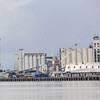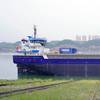Wärtsilä, MAN Diesel Hercules-Beta Project
The Hercules-Beta research project proposal was recently approved by the European Commission. HERCULES-Beta represents a major international cooperative effort to maximise fuel efficiency combined with ultra-low emissions and to develop future generations of optimally efficient and clean marine diesel engines. As such, HERCULES-Beta aims to surpass the current limits set by the International Maritime Organization (IMO) to radically improve the environmental performance of waterborne transport.
HERCULES-Beta began on 1 September 2008 with a budget of $33.6m and it is planned to run for 36 months. The project consortium has 32 participants, including engine-component suppliers, equipment manufacturers, universities, research institutions and shipping companies from 10 European countries.
HERCULES-Beta is the second phase of the HERULES programme, which was conceived in 2002 as a long-term strategic R&D plan. The project was initiated by Europe's two major engine manufacturers, Wärtsilä Corporation and MAN Diesel. Diesel propulsion systems currently power 99% of the world fleet.
The project's principal aim is to reduce marine diesel engine fuel consumption by 10% and to improve the efficiency of marine diesel propulsion systems to more than 60%, significantly reducing CO2 emissions as a result. A further aim of the project is to target ultra-low exhaust emissions by eliminating 70% of NOx and 50% of particulates from marine engines by 2020.
HERCULES-Beta comprises 54 subprojects and is funded by the European Commission's Framework Program 7 (FP7, Theme Transport).
In 2007, a group of more than 40 European companies, universities and research institutions, led by MAN Diesel and Wärtsilä Corporation, successfully completed a major, 43-month, cooperative research project under the name HERCULES (High Efficiency R&D on Combustion with Ultra-Low Emissions for Ships) with a budget of $44.3m, partly funded by the European Union $20.1m and the Swiss Federal Government $3.4m.
The first phase of the HERCULES project concentrated on the development of tools (e.g., simulation software, measurement techniques, etc.) and the general investigation of potential avenues for reducing emissions and fuel consumption. Initially, the project established and operated prototypes. The results stemming from this indicate a great potential for significantly reducing fuel consumption and emissions and reaching the project's ambitious targets.
HERCULES-Beta will directly build on the findings of the first phase of the HERCULES project. The tools previously established will be employed to more closely investigate, understand and ultimately optimise the engines. Both analytical investigations as well as prototypes will be refined, based on first-phase results, with the intention of achieving the ultra-low emission and fuel consumption targets. Finally, by carrying out field-tests on the prototypes developed in the first phase, information on the important effect of real-life boundary conditions will be gathered and analysed.
(www.ip-hercules.com)











